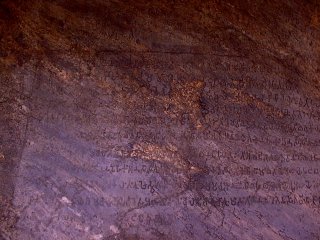New York Philharmonic, Chorus, and Soloists To Give World Premiere of Peter Lieberson's Buddhist-Inspired Cantata "The World In Flower"
"Searching for evidence of an avant-garde in classical music in New York this spring, one finds instead the different excitement of composers reviewing their legacies of musical language, vocabulary, and style and reshaping them into new experiences. Ideas of retrenching into easy-listening romanticism are definitely old hat.
Between March and June, the most prominent local event will probably be the first performances of Peter Lieberson's big cantata The World in Flower, scheduled for late May [May 24 - 27] by the New York Philharmonic, which commissioned the work. Now 59 years old, Lieberson was early on deemed a Stravinskyan neoclassicist, but widely different influences have fertilized his music over the last three decades. ...
... And deep studies of Buddhism certainly expanded the spiritual horizons of his later music. What could be called spiritual lyricism was sustained right into last year's Neruda Songs, written for and inspired by his second wife, the great mezzo Lorraine Hunt Lieberson. [Ms Hunt Lieberson will be singing Neruda Songs, this Saturday, March 11, with the Boston Symphony Orchestra, under David Robertson, at the John F. Kennedy Center for the Performing Arts.]
The World in Flower is the third panel of a triptych dealing with rulers whose growth from violent aggression to spiritual enlightenment was fatally misunderstood by their people. The first panel was the narrated saga King Gesar, and the next was his first full-scale opera, Ashoka's Dream." ...
Leighton Kerner "Tweaking Their Legacies: Composers Reinvent Themselves" The Village Voice, March 6, 2006.
http://villagevoice.com/nyclife/0610,kerner,72397,15.html
*
From the New York Philharmonic Web-site:
Peter Lieberson "The World in Flower (2005)
The World in Flower for solo and choral voices is the last of a series of works inspired by enlightened rules from the East, and focuses on Emperor Shotoku Taishi who brought Buddhism to Japan. Peter Lieberson, himself a Buddhist, reflected on composing for the voice in connection with his opera Ashoka’s Dream. "I didn’t quite appreciate at the time … just how the voice is different from other instruments and what it takes to produce sounds and sing a line—to phrase it and to 'breathe' it. I’ve learned a lot from hearing Lorraine [Hunt Lieberson, his wife, who will perform in the new work] … and without a doubt I took into account this difference."
Lorin Maazel will be the conductor of this world premiere, with soloists Lorraine Hunt Lieberson, Mezzo-Soprano, Gerald Finley, Baritone, and the New York Choral Artists, Joseph Flummerfelt, director.
An audio clip and program notes will be available at a later date at:
http://nyphil.org/attend/season/index.cfm?page=eventDetail&eventNum=745&seasonNum=5

Emperor Ashoka's edicts -- which renounced warfare and violence as an instrument of State policy and colonialization -- were ordered by the great Indian Buddhist Emperor to be carved into rock faces, and on stone stela, throughout the early Indian Empire.
[These edicts are the basis of one of my oratorio librettos.]
Photo credit: www.worldpolicy.org/.../ Asoka-edicts.html With thanks.
Between March and June, the most prominent local event will probably be the first performances of Peter Lieberson's big cantata The World in Flower, scheduled for late May [May 24 - 27] by the New York Philharmonic, which commissioned the work. Now 59 years old, Lieberson was early on deemed a Stravinskyan neoclassicist, but widely different influences have fertilized his music over the last three decades. ...
... And deep studies of Buddhism certainly expanded the spiritual horizons of his later music. What could be called spiritual lyricism was sustained right into last year's Neruda Songs, written for and inspired by his second wife, the great mezzo Lorraine Hunt Lieberson. [Ms Hunt Lieberson will be singing Neruda Songs, this Saturday, March 11, with the Boston Symphony Orchestra, under David Robertson, at the John F. Kennedy Center for the Performing Arts.]
The World in Flower is the third panel of a triptych dealing with rulers whose growth from violent aggression to spiritual enlightenment was fatally misunderstood by their people. The first panel was the narrated saga King Gesar, and the next was his first full-scale opera, Ashoka's Dream." ...
Leighton Kerner "Tweaking Their Legacies: Composers Reinvent Themselves" The Village Voice, March 6, 2006.
http://villagevoice.com/nyclife/0610,kerner,72397,15.html
*
From the New York Philharmonic Web-site:
Peter Lieberson "The World in Flower (2005)
The World in Flower for solo and choral voices is the last of a series of works inspired by enlightened rules from the East, and focuses on Emperor Shotoku Taishi who brought Buddhism to Japan. Peter Lieberson, himself a Buddhist, reflected on composing for the voice in connection with his opera Ashoka’s Dream. "I didn’t quite appreciate at the time … just how the voice is different from other instruments and what it takes to produce sounds and sing a line—to phrase it and to 'breathe' it. I’ve learned a lot from hearing Lorraine [Hunt Lieberson, his wife, who will perform in the new work] … and without a doubt I took into account this difference."
Lorin Maazel will be the conductor of this world premiere, with soloists Lorraine Hunt Lieberson, Mezzo-Soprano, Gerald Finley, Baritone, and the New York Choral Artists, Joseph Flummerfelt, director.
An audio clip and program notes will be available at a later date at:
http://nyphil.org/attend/season/index.cfm?page=eventDetail&eventNum=745&seasonNum=5

Emperor Ashoka's edicts -- which renounced warfare and violence as an instrument of State policy and colonialization -- were ordered by the great Indian Buddhist Emperor to be carved into rock faces, and on stone stela, throughout the early Indian Empire.
[These edicts are the basis of one of my oratorio librettos.]
Photo credit: www.worldpolicy.org/.../ Asoka-edicts.html With thanks.


0 Comments:
Post a Comment
<< Home